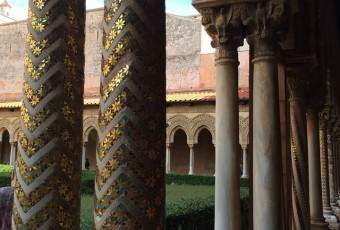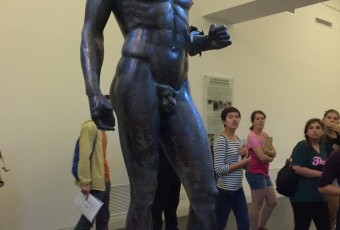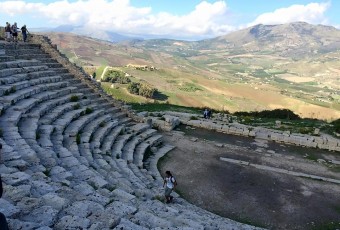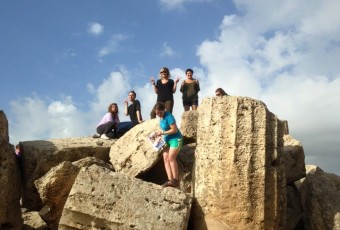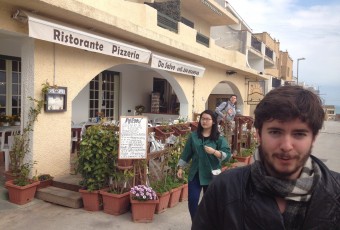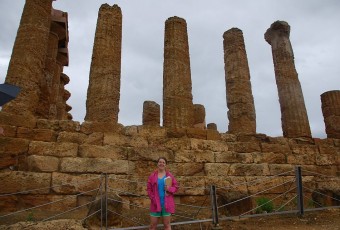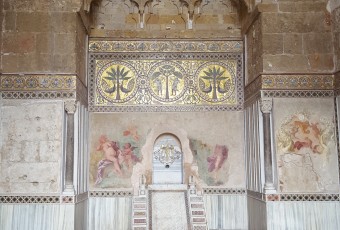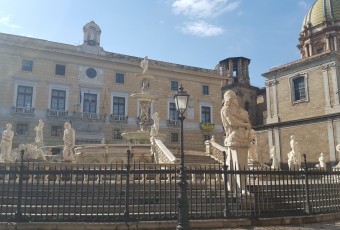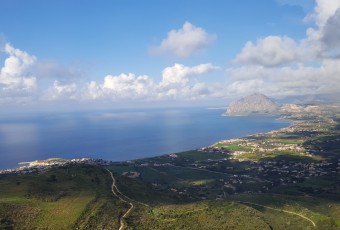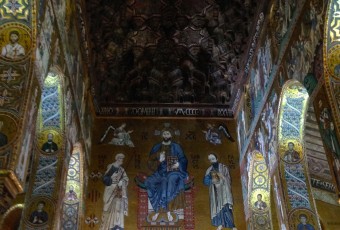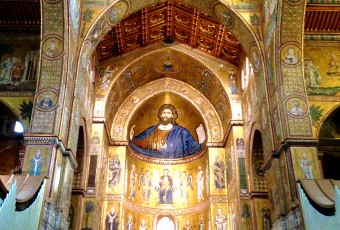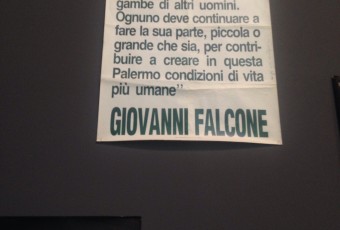Spotted between a visit to the stunning Cappella Palatina and my first serving of pasta on our trip, signs of this … [Read More...]
Sicily Trip
Italian 3008 – Latin 3311 - Spring 2016
Professors Barbara Weiden Boyd and Davida Gavioli
la spedizione siciliana
This faculty-led study trip, “Sicily: Mediterranean Pasts, Presents, and Futures,” has guided students to an in-depth understanding of the historical, social, and cultural complexities of the island of Sicily, now a part of the nation of Italy but, in the course of its long history as cultural crossroads, home to several early indigenous peoples of the western Mediterranean as well as colonizing Phoenicians, Greeks, Romans, Spanish, French, and Arabs over the course of more than 3000 years. Because of its strategic location, long history, and a new appreciation for its cultural riches, Sicily is the perfect vantage-point from which to consider the Mediterranean world as a whole, through both historical and contemporary lenses.
In the spring 2016 semester, two Bowdoin faculty members, Davida Gavioli (Italian) and Barbara Weiden Boyd (Classics), offered upper-level courses focusing of various aspects of Sicilian history and culture. Gavioli’s course, Italian 3008 (Of Gods, Leopards, and ‘Picciotti’: Literary Representations of Sicily Between Reality and Metaphor) was organized around literary texts written by Sicilian writers and/or located in the Sicilian landscape, drawn from 20th and 21st century authors; central themes of the course included issues of cultural identity long a part of Sicilian discourse (e.g., is Sicily “truly” Italian? is Sicily really part of Europe, or should it be considered fundamentally Other? etc.) as well as major contemporary social and political issues (the economy; the Mafia; immigration and asylum; etc.). Boyd’s course, Latin 33 (Sicily in the Roman Imagination), was organized around the literary texts commemorating the appropriation of Sicily first by the Greeks and subsequently by the Romans between the 5th and 1st centuries BC. Students read several significant ancient texts in Latin concerning Rome’s occupation and colonization of Sicily, supplemented by readings in English drawn from the many Greek poets and historians who were active in ancient Sicily.
Blog Posts
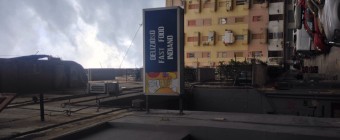
Day 2: arbitrary amalgam of three cultures
By aglynn
Andiamo in Sicilia
By djohnso
This is huge. Adamo and I studied abroad in Bologna, Italy together, and we never thought we would return after our … [Read More...]

Un po’ di cibo
By djohnso
After a wonderful day of traveling, the group needed a fine Italian appetizer to finish the day. We had seen old … [Read More...]
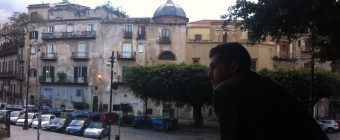
Sunday: jet lag and Palermo
By abradley
After a long day of travel, we were so excited to reach Palermo. We met our bus driver, Carmelo, who took us to an exhibit of the … [Read More...]
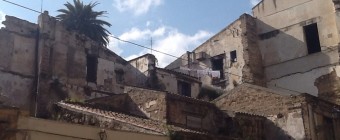
Day 3: Palermo
By djohnso
During our walking-tour of Palermo, our attention was directed towards various ruins and abandoned floors of buildings … [Read More...]
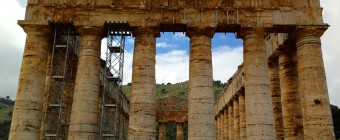
The Temple at Segesta
By gmaslak
In Segesta we visited our first Ancient Greek temple, which was constructed with local stone in the Doric order. The distinct … [Read More...]
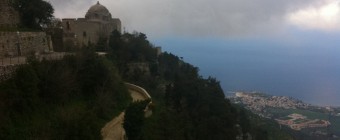
Day 3: Erice
By abradley
After a beautiful visit to Segesta, where we were among the few tourists and hiked through wildflower-lined paths to the Greek … [Read More...]
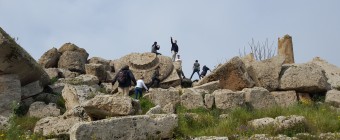
Temple G, Selinunte
By ssim
Although some scholars hypothesize that this temple seen in the archaeological park of Selinunte was dedicated to the god, Zeus, … [Read More...]
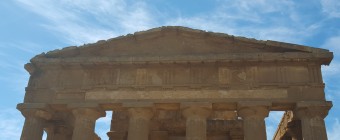
Temple of Concord, Agrigento
By ssim
The Temple of Concord located in the Valle dei Templi of Agrigento is one of the most well-preserved examples of a Greek temple … [Read More...]
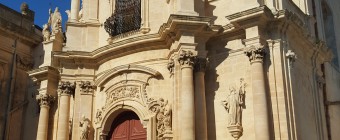
Church of San Giuseppe, Ragusa
By ssim
Once we had traveled to the south-eastern part of Sicily, the architectural style of the buildings began to look less medieval and … [Read More...]
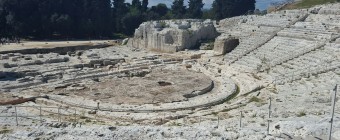
Greek Theater, Syracuse
By ssim
The Greek Theater in Syracuse exemplifies the architectural ingenuity of Classical builders and also highlights the contrasts … [Read More...]
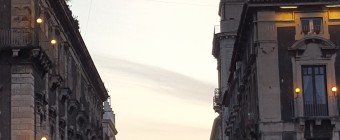
The Streets of Catania
By ssim
Similar to many other cities in the south-eastern region of Sicily, Catania was heavily affected by the destructive power of the … [Read More...]
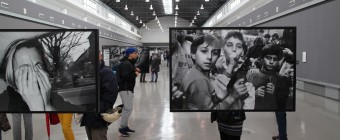
Day 1: Letizia
By mcolbert
Hello to the readers of this Bowdoin Sicilian Expedition blog. I’m Michael, a senior Romance Languages major, and a lot of my … [Read More...]
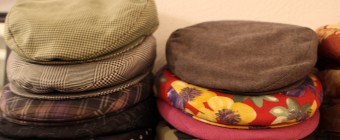
Day 2: Coppola storta
By mcolbert
Similar to my post for Day 1, today I’ll also be looking at the mafia but in another way. On our second night in the city, we went … [Read More...]
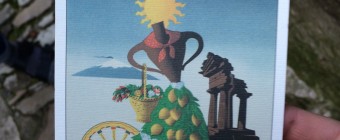
Day 3: Picturesque
By mcolbert
Stepping away from the mafia, I found this postcard while we were walking around Erice. While on the one hand it evokes Josephine … [Read More...]
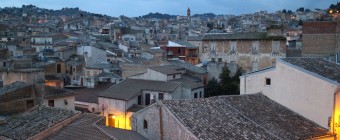
Day 4: Racalmuto
By mcolbert
Literary parks are a peculiar Italian institution. While some places capitalize on writer sites for tourism (like Sherlock Holme’s … [Read More...]
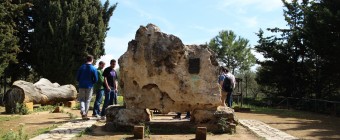
Day 5: Pirandelliano
By mcolbert
The next day, we continued following writers through Italy. After visiting downtown Porto Empedocle to see traces of Montalbano … [Read More...]
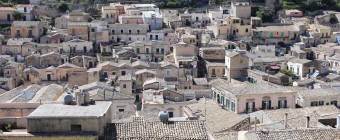
Day 6: The Baroque
By mcolbert
Another face of Sicily that doesn’t get discussed in the vision of the picturesque is the island’s baroque side. Among the many … [Read More...]
